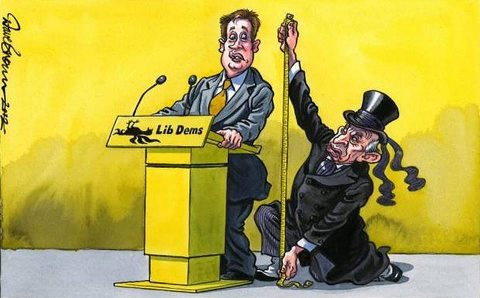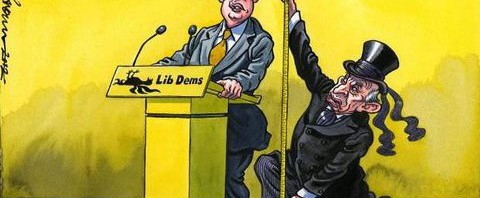
Until Andrew Mitchell swears that he never used the word pleb, we assume that he did. Until the chief whip has the police officers sacked for giving false witness, we assume that he did. His carefully worded non-apology dared not deny he said it – so he did.
The Sun, with its notoriously close contacts inside the Met, produces chapter and verse, written down by the officers in self-protection after Mitchell’s parting shout: “You haven’t heard the last of this!” Downing Street briefers’ claiming that this is all a Police Federation scam won’t wash. Why not? No one thinks those police officers invented that particular word. “Best learn your fucking place” and “You’re fucking plebs” is Flashman public school bully-speak of Mitchell’s generation, far too authentic to fake. If he was younger, Mitchell might have said “chav”, as Princes William and Harry do: remember their chav party, dressing up in what they imagined were lower-class clothes.
David Cameron should have sacked Mitchell instantly to stop that word dogging his government for ever. “Pleb” says not just how Cameron and co think, but it defines with deadly accuracy who they govern for. This stamps them as a Mitt Romney regime – not bothering with the plebs, not with the bottom half. This crystallises how they ignore those who are not their voters, not their leafy shire constituents. They govern for those who their class sometimes calls PLUs – “people like us”. The social class of Cameron’s crew hardly matters: what counts is whose side they are on. Without a shadow of a doubt, they rule for their own ruling class.
“Plebs” means the great mass of people not like them – casting all low-earners in the same pool, how cleverly Iain Duncan Smith, Chris Grayling and the prime minister elide the dysfunctional few with the great majority of the poor who work, but can’t earn enough. The media helps, even the BBC, in programmes such as Neighbourhood Watched, seeking out the telegenic worst, maddest and most helpless on housing estates: job done, that’s the plebs in social housing, that’s everyone on benefits or on credits. Little wonder the public turns against paying for them. Of course, it’s far too dull to film toiling but grossly underpaid cleaners, guards and carers.
The head of the Institute for Fiscal Studies told the Liberal Democrats some uncomfortable truths at their conference in Brighton this week. Under banners reading “Fairer tax in tough times”, Paul Johnson told them that their much-vaunted raising of the tax threshold so that no one pays tax until earning over £10,000 did little for the low-paid. The main gainers, he said, are in the top third of incomes. The bottom third already earn too little to pay tax, and the middle third gain little: the top get most. And this policy costs a monumental £10bn that could have been targeted on benefits, tax credits, housing and childcare to help the struggling 50%. But the great austerity – especially the £18bn of benefit cuts – fell on them.
What would fairer tax look like? Council tax is the most regressive – the more expensive the property, the lower the proportion of tax paid – so correct that first, and then turn to a mansion tax. Britain’s wealth taxes have atrophied. Inheritance tax doesn’t work, capital gains entirely forgiven at death. As for the 50p top tax rate, because the rich had a year’s notice they took their income in the year before it was introduced. Then, as soon as the cut to 45% was announced a year ahead, they delayed their income until it came in. This two-year tax planning, says the IFS, cost the exchequer £18bn. That’s the same as the £18bn cut from the poorest.
It shows just what colossal discretionary sums float among the few at the top: a one-off levy could solve half the national debt while barely touching their lifestyles. The rich protest it’s unfair that the top few contribute nearly 30% of income tax. But that’s because they command such a gigantic share of national income. Their plea worked and the cut brought millionaires an extra £14,000 each.
Defending that cut, David Laws, now back in government, says: “As a liberal, I feel uncomfortable at the idea of the state taking half or more of anyone’s income.” So will Vince Cable win his mansion tax? The business secretary told the BBC on Monday that he still had “some persuasion to do” with George Osborne – though he would take a quite modest £2bn.
The Resolution Foundation’s latest report – Who Gains from Growth? – shows the frightening pace at which the rich will get richer as the 50% of middle and low earners fall away over the next eight years. The IFS has calculated that even if growth leaps ahead with no more cuts, middle incomes will drop 3% while those of the low-paid will fall a frightening 15%. But those on £50,000-plus will see earnings rise. If growth, as expected, is slower, then the prognosis is worse. The squeezed middle is being crushed.
As ever, the Lib Dems strive to convince on social justice. Nick Clegg says he will block any further welfare cuts unless he gets a wealth tax: small comfort to the low-paid being hit yet again. He and his party are in denial about almost everything the coalition does to accelerate inequality. A living wage, a chance to earn, serious craft apprenticeships, an affordable home – all are slipping from the “pleb” 50%.
on Monday an attempt to slow the ferocity of the great austerity failed at the conference, though its mover said: “Keynes would have held the party’s economic policy in contempt.” Lib Dem ministers stamped on it, even the supposedly radical Tim Farron warning hysterically that only Plan A “stands between us and market chaos”. Cable spoke well, warning that any more cuts would be on a down escalator to a higher deficit – apparently not noticing that’s exactly what is happening. Social democrat at heart he may be, but like the rest he colludes in Osborne’s anti-Keynesianism that stifles growth. “As a real pleb” he joked about himself, and brought the house down – but like the rest he doesn’t govern for them.
Andrew Mitchell has made a gift to Labour. But it will need policies of unaccustomed radicalism to turn back this great tide of inequality, inheriting a country yet more deeply divided by policies that punish the plebs most.
Dogma and Disarray – Cameron at Half-Time, by Polly Toynbee and David Walker, is available from guardianbookshop.co.uk
guardian.co.uk © Guardian News & Media Limited 2010
Published via the Guardian News Feed plugin for WordPress.


3 Responses
goodbye soooolong jeff3
The Lib Dems are toast when the next election comes around. Even if the Tories survive, the Lib Dems are going down.
well being disabled now means pleb or is it plebondicus .. jeff ..